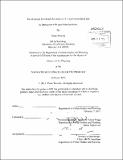Development for whom? : an analysis of a rural intervention and its interaction with agricultural policies
Author(s)
Winicki, Paula
DownloadFull printable version (5.345Mb)
Alternative title
Analysis of a rural intervention and its interaction with agricultural policies
Other Contributors
Massachusetts Institute of Technology. Department of Urban Studies and Planning.
Advisor
Xavier de Souza Briggs.
Terms of use
Metadata
Show full item recordAbstract
This thesis examines the means and ends of development by addressing two main questions: 1) How does the Colombian state's neoliberal understanding of development affect the socio economic conditions of small farmers? And 2) How do nongovernmental organizations (NGOs) that embrace the neoliberal approach to development interact with local communities in their land struggles? To explore these questions, this thesis focuses on a rural intervention by the organization Entrepreneurial Rural Development (ERD), in the Afro-Colombian correginiento of Las Marías (pseudonyms). I focus on this area because it embodies the contradictions in Colombia's agricultural policies: while government-supported programs such as ERD aim to ignite the social and economic development of small farmers, operating concurrently neoliberal policies curtail it. I first analyze how the ERD depoliticized its intervention, and how at the same time its activities have led to the emergence of new leadership in the community. Moreover, I investigate how socio political conditions within the community have significantly limited the success of the ERD's intended process of shaping the peasants with whom they work as small entrepreneurs. I also consider the extent to which the technologically and culturally oriented approach to the community's issues espoused by many of the organization's workers limited their understanding of the farmers' (already) entrepreneurial behavior. Micro-level interventions such as ERD cannot be studied in isolation. Rather, they need to be set in the context of the macro policies that either hinder or encourage the development of small farmers. In a country such as Colombia, which exhibits highly concentrated land ownership and wealth, I argue that neoliberal restructuring and the forms it has taken in the government's agricultural policies have shown a class bias toward large farmers. This bias has led to exclusionary growth, which undercut both access to land and employment for small farmers. The thesis concludes by outlining reforms to address these structural challenges.
Description
Thesis (M.C.P.)--Massachusetts Institute of Technology, Dept. of Urban Studies and Planning, 2013. Cataloged from PDF version of thesis. Includes bibliographical references (p. 71-79).
Date issued
2013Department
Massachusetts Institute of Technology. Department of Urban Studies and PlanningPublisher
Massachusetts Institute of Technology
Keywords
Urban Studies and Planning.